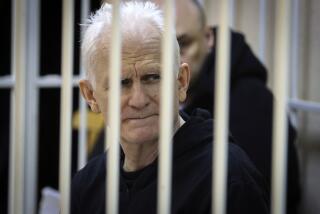Aimed At Influencing West, Ex-Inmate Says : Release of Soviet Dissidents Called Ploy
- Share via
WASHINGTON — Soviet psychiatrist Anatoly Koryagin, describing his six years of mental and physical abuse in prison camps, told a congressional hearing Friday that the release of about 100 political prisoners in recent months is meant chiefly to influence Western opinion of the Soviet Union, and that Moscow’s basic attitude toward dissent remains unchanged.
Koryagin, who spent two of his six years in prison on hunger strikes, force-fed with a tube through his nose, expressed dismay at Western enthusiasm for Soviet leader Mikhail S. Gorbachev’s campaigns for glasnost, or openness, and “democratization.”
“Why are prisoners of conscience still held today in the same camps and psychiatric hospitals under the same articles of the criminal code? Why are chemicals still used as a means of torture in psychiatric wards? Why do religious believers still not have the most elementary rights?” Koryagin asked.
“The Gulag and the political psychiatric wards still function,” he said. “Such is the state of human rights” in the Soviet Union.
Speaking in Russian with the aid of translator, Koryagin told the congressional commission that monitors the Helsinki accords on East-West cooperation and security that as of the end of 1986, human rights activists in the Soviet Union had learned the names of 183 political prisoners still held in special psychiatric hospitals for the criminally insane.
He said the number of these hospitals has grown from 11 in 1977 to 16 at present. Ringed by barbed wire and watchtowers, they remain under the control of the MVD, or national police, rather than the Ministry of Public Health.
“All their medical personnel are officers of the MVD, and this is their primary loyalty, not the medical profession,” he said.
In addition to these 183 prisoners, Western human rights groups have identified about 470 others in camps, prisons and internal exile who remain to be freed. Koryagin said there are unquestionably many others.
Of the estimated 110 prisoners who have been released in recent months, Koryagin said the Soviet authorities were selecting those who were best known in the West and whose plight therefore was most damaging to Moscow’s image in the minds of Westerners.
“The Soviet Union has decided it wants better relations with the West,” he said. “People who sit quietly (in prison) are no great danger to the authorities. Those who make noise make them uncomfortable, and they want to get rid of this irritant.”
Wrath of Soviet Authorities
Koryagin incurred the wrath of Soviet authorities in 1981 when he wrote a widely read article in the British medical journal Lancet describing the use of false diagnoses of schizophrenia to imprison healthy dissidents in wards for the criminally insane, and their treatment with mind-altering “neuroleptic” drugs.
Under pressure from American and European psychiatric groups, the Soviet Union was forced to withdraw from the World Psychiatric Assn. Koryagin, arrested and sentenced in 1981 to seven years in prison and five more in internal exile, was freed in February and allowed to emigrate last month. He and his wife and three sons now live in Switzerland.
In a later appearance Friday before the American Enterprise Institute in Washington, Koryagin said it was difficult for anyone who was not “born, raised and persecuted in the Soviet Union” to understand the changes taking place under Gorbachev. The Soviet leader, he noted, is calling for “democratization” of society but specifically avoids using the word “liberalization” to describe his aims.
Soviet authorities, Koryagin said, understand democratization to mean that “within certain limits people will have the opportunity to speak of certain flaws in the system, and in this way assist the leaders in improving it.”
More to Read
Sign up for Essential California
The most important California stories and recommendations in your inbox every morning.
You may occasionally receive promotional content from the Los Angeles Times.










